Specifications
| Manufacturer | Molekule |
| Model | Air |
| Dimensions (inches / cm) | 8.25 x 8.25 x 23 inches (20.1 x 20.1 x 58.4 cm) |
| Weight (pounds / kg) | 18.0 lb (8.2 kg) |
| Clean Air Delivery Rate (CADR) | - |
| Filtration Technology | Pre-filter and PECO-filter |
| Filter Replacement Indicator | Yes |
| Filter Life | 3 months (pre-filter), and 6 months (PECO-filter) |
| Number of Fan Speeds | 3 – Silent Mode, Auto Mode, and Boost Mode |
| Air Quality Sensor Air Quality Sensor Summary: Out of 67 air purifiers tested, only 31 have the air quality sensor. | No |
| Air Quality Indicator | No |
| Auto Mode Auto Mode Summary: Out of 67 air purifiers tested, only 32 have auto mode functionality. | Yes |
| Smart App Smart App Summary: Out of 67 air purifiers tested, only 20 have smart app functionality. | Yes |
| Voice Control Voice Control Summary: Out of 67 air purifiers tested, only 20 have voice control functionality. | Yes |
| Other Features | Dark Mode |
| Coverage (4.8 ACH)
Room Coverage Explanation: ACH is a measurement used in indoor air quality management to indicate how many times the air within a defined space is changed/moved through the filter media.
For more details, visit our ACH calculator tool. | 130 sq. ft. (12 m²) |
| Performance Ratings Performance Ratings Score Summary: 8.6 - Average Score (67 products) 9.8 - Best Score (2 products) 2.5 - Worst Score (1 products) We use the Temtop LKC-1000S laser particle meter to test the particle removal efficiency of every air purifier. It measures PM2.5 (µg/m3), PM10 (µg/m3), Particles (per/L), and HCHO (mg/m3) in the air, and also calculates the AQI. You can read more about our testing methodology here. | |
| Power Consumption
Power Usage Summary: Our extensive testing of 67 air purifiers revealed the following power consumption insights:
Check out our power consumption calculator tool. | 80W |
| Operating Costs Ratings Operating Costs Ratings Score Summary: 9.1 - Average Score (67 products) 10 - Best Score (2 products) 8 - Worst Score (1 products) We measure the power usage at all speeds using an energy meter, after which we calculate how much it would cost to use the device at a particular fan speed for one month. For reference, we use an energy price of $0.12 per kWh. You can read more about our testing methodology here. | |
| Noise Level (low – high) | 42.0 – 67.4 dBA |
| Noise Ratings Noise Ratings Score Summary: 9.3 - Average Score (67 products) 10 - Best Score (1 products) 8.2 - Worst Score (1 products) We use a special noise measurement tool to test the noise level of the air purifier at all speeds. We measured the noise level on the dBA scale. You can read more about our testing methodology here. | |
| Best Suited For | Small Spaces |
| Warranty | 2-year |
Full Review
After testing various air purifiers with different features, prices, and capacities, I decided to test a premium air purifier this time. In this review, I present a comprehensive evaluation and test of the Molekule Air.
The Molekule Air is a slightly older model, but it’s still available and highly popular.
What fascinates me about this Molekule is the negative reviews from Wirecutter and Consumer Reports, which contrast with plenty of positive reviews on other review sites.
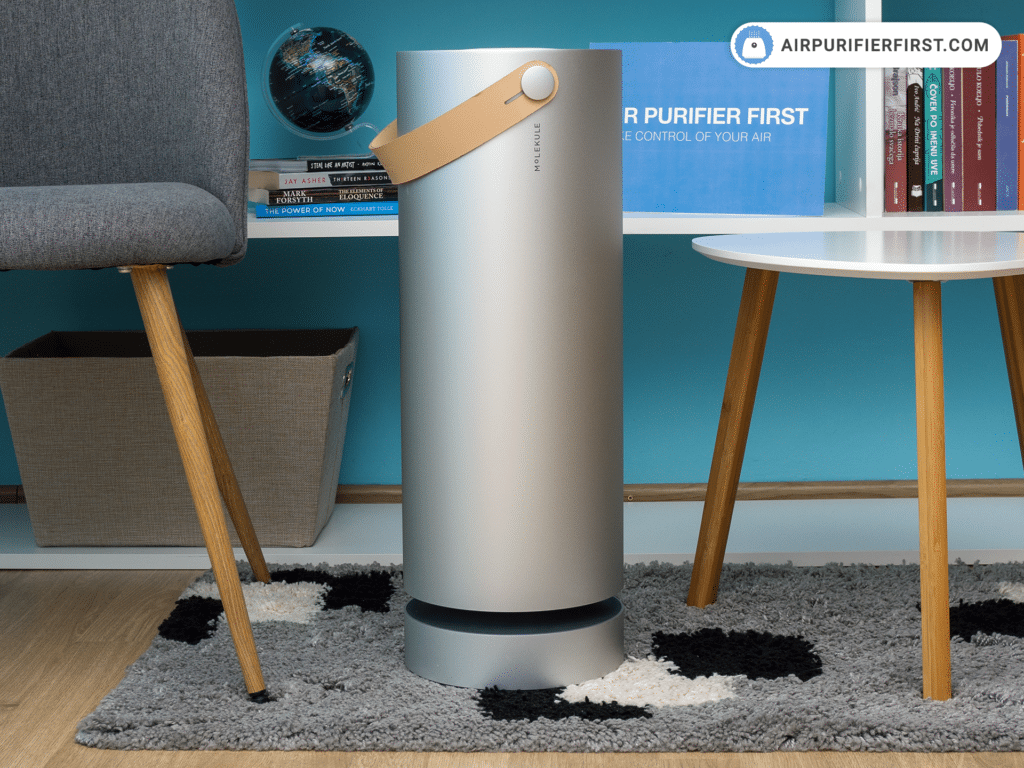
I always wanted to test and share my thoughts on the Molekule Air and see whether it’s really that good/bad.
The Molekule Air is a premium air purifier designed for spaces up to 130 sq. ft. (12 m²) with an ACH of 4.8. The unit is heavy, large, and fully wrapped in aluminum. It’s, without a doubt, one of the highest-quality air purifiers I have ever had the opportunity to use.
The Molekule is also characterized by its patented PECO filtration technology, which the company claims is more efficient than traditional HEPA filtration.
This luxurious, cutting-edge, minimalist device doesn’t have many advanced features to highlight. However, it can be linked to a smart app, has some interesting modes, and is definitely worth checking out.
Read on to discover how the Molekule Air performed in our performance, noise, power consumption, and smoke tests.
How We Tested the Molekule Air?
1. For the filter efficiency testing, we used the Temtop LKC-1000S laser particle meter, which measures PM2.5 (µg/m3), PM10 (µg/m3), Particles (per/L), and HCHO (mg/m3) in the air, and also calculates the AQI.
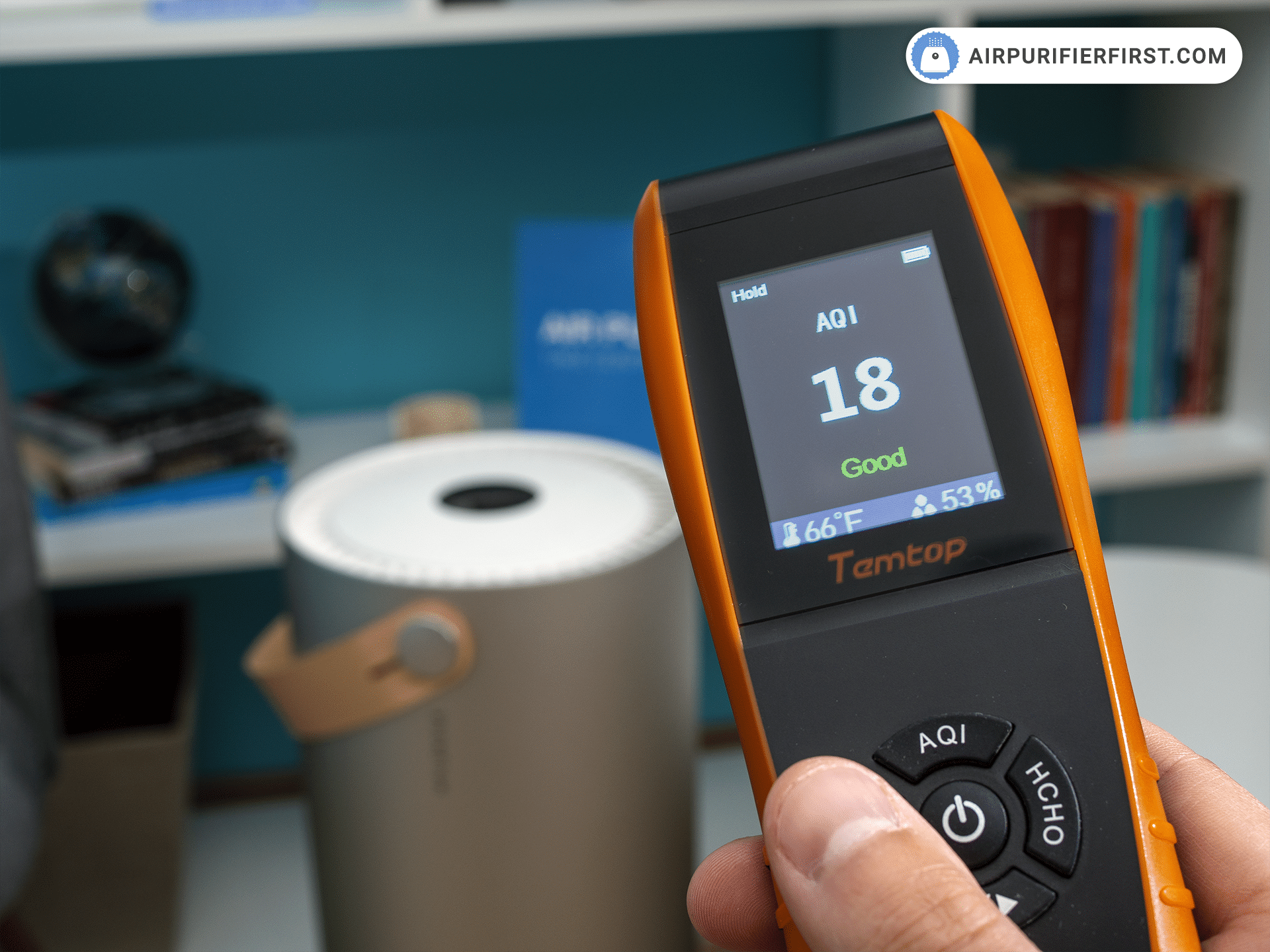
2. We placed the Molekule Air in two separate performance tests, one in a 320 sq. ft. (30 m²) room and the other in a 560 sq. ft. (52 m²) room. Then, we recorded the initial air quality values using the Temtop laser particle meter and let the Molekule Air run at maximum speed.
3. After 60 minutes, we measured the new values using the Temtop laser particle meter and saved the data.
4. Next, we placed the Molekule Air in a glass box, which we then filled with smoke. Then, we measured how much time was needed for the air purifier to remove all the smoke from the box.
5. Using a special noise measurement tool, we tested the air purifier’s noise level at all speeds. We measured the noise level on the dBA scale.
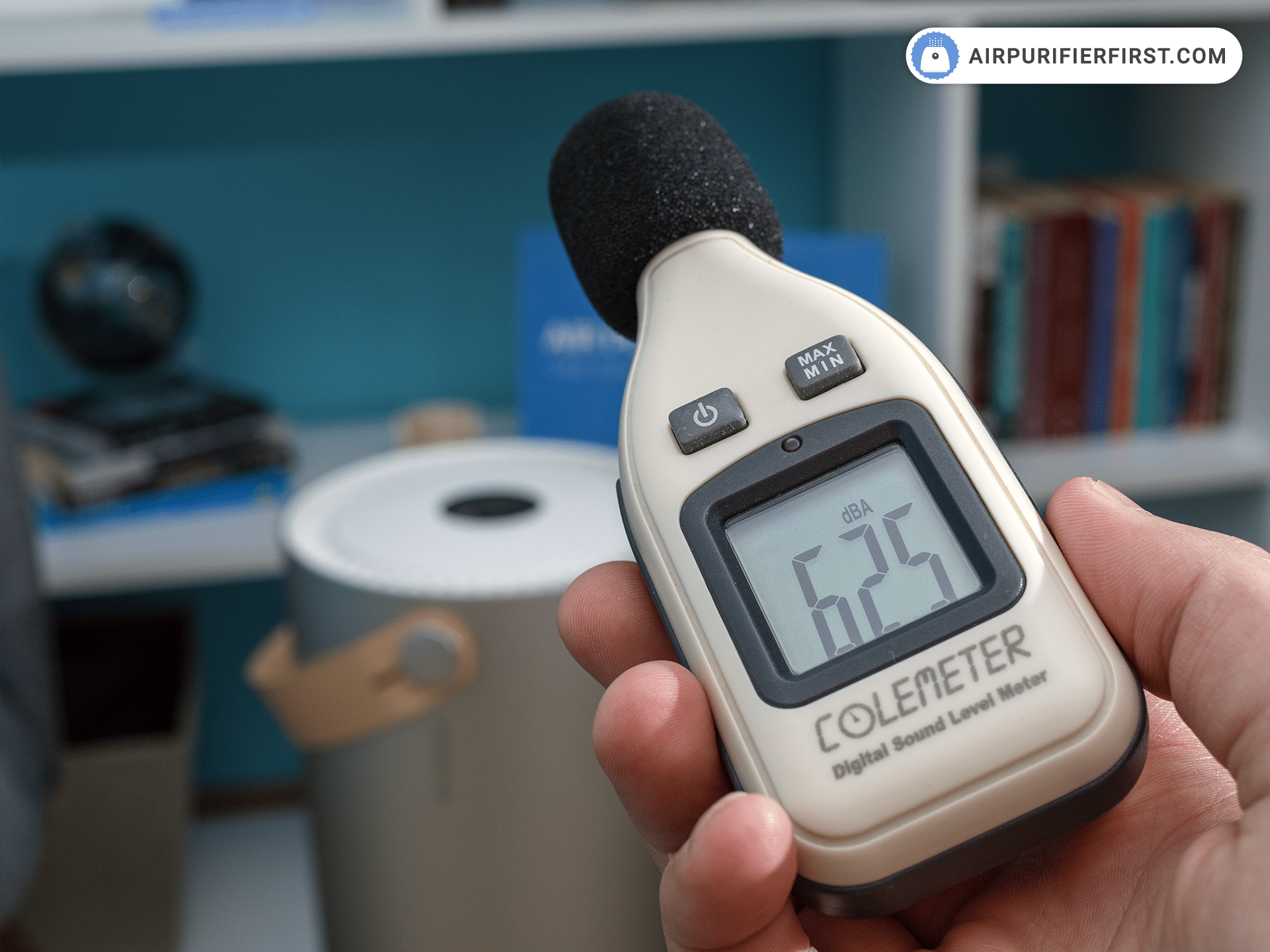
6. Finally, we measured the power usage at all speeds using an energy meter, after which we calculated how much it would cost to use the device at a particular fan speed for one month. For reference, we used an energy price of $0.12 per kWh.
Performance – Particle Removal Tests
Performance – Particle Removal Tests:
8.6 - Average Score (67 products)
9.8 - Best Score (2 products)
2.5 - Worst Score (1 products)
We use the Temtop LKC-1000S laser particle meter to test the particle removal efficiency of every air purifier. It measures PM2.5 (µg/m3), PM10 (µg/m3), Particles (per/L), and HCHO (mg/m3) in the air, and also calculates the AQI.
You can read more about our testing methodology here.
Molekule claims that the Molekule Air is suitable for rooms up to 600 sq. ft. (56 m²), which, in my opinion, is too ambitious for this air purifier.
Although Molekule offers the option to select the optimal room size for operation, with categories provided, I wouldn’t necessarily rely on this information. There are three options available: <200 sq. ft.; 200 sq. ft. – 400 sq. ft.; and >400 sq. ft.
Considering that the Molekule has a CADR of approximately 100 CFM, we can easily conclude that this device is best suited for rooms up to 130 sq. ft. (12 m²). In a room of this size, the Molekule will clean the air 4.8 times in one hour.
However, to verify the manufacturer’s claims, we tested the Molekule in somewhat larger rooms. My main conclusion is that while Molekule Air cleans the air, it does it much more slowly than expected and more slowly than the manufacturer claims.
I would say that its performance is much slower and less efficient than many smaller, cheaper, and less powerful air purifiers we’ve tested. Take a look at the tests and charts below, and everything will become clear.
Testing in a 320 sq. ft. (30 m²) Room
In the first test, we placed the Molekule Air in a 320 sq. ft. (30 m²) room. We measured the initial air quality data using the Temtop laser particle meter and then let the unit run at maximum speed for 60 minutes.
After that time, the Molekule Air reduced the PM2.5 particulate matter from 100.3 to 11.4 µg/m³, which is an air quality improvement of about 88%.
| # | Starting Baseline | After 60min |
|---|---|---|
| PM 2.5 | 100.3 µg/m3 | 11.4 µg/m3 |
| PM 10 | 140.5 µg/m3 | 15.9 µg/m3 |
| Particles | 145564 per/L | 16530 per/L |
| AQI | 131 | 16 |
This isn’t a bad result, but compared to competitors (see the chart below), it’s well below the average for tests performed in this room.
Particle Removal Test Room - Comparison
Comparison between the Molekule Air and its competitors in particle removal tests in a 320 sq. ft. (30 m²) room.
For example, the much smaller Levoit Vital 100S improved air quality by about 94% in the same test.
Additionally, the Winix 5500-2, one of the best air purifiers I’ve tested so far, was much faster and showed significantly better results in the same test, improving air quality by 96%.
Testing in a 560 sq. ft. (52 m²) Room
In the second test, conducted in a 560 sq. ft. (52 m²) room, the Molekule showed slightly weaker results than in the previous test.
After 60 minutes of operation at maximum speed, the Molekule Air improved air quality by approximately 70%, reducing the PM2.5 particulate matter from 89.9 to 25.9 µg/m³.
| # | Starting Baseline | After 60min |
|---|---|---|
| PM 2.5 | 89.9 µg/m3 | 25.9 µg/m3 |
| PM 10 | 125.9 µg/m3 | 36.2 µg/m3 |
| Particles | 130494 per/L | 37507 per/L |
| AQI | 118 | 35 |
We left the Molekule running for some time after completing the test, and it did continue to improve the air quality in the room. However, despite this, my conclusion is that I am not satisfied with the air cleaning performance and speed of this model.
Performance – Smoke Removal Test
The Molekule Air doesn’t use a traditional activated carbon filter, so I was a bit skeptical about its performance in the smoke removal test.
However, the Molekule Air surprised me with a fantastic result. It removed all the smoke from the glass box in just 29 seconds.
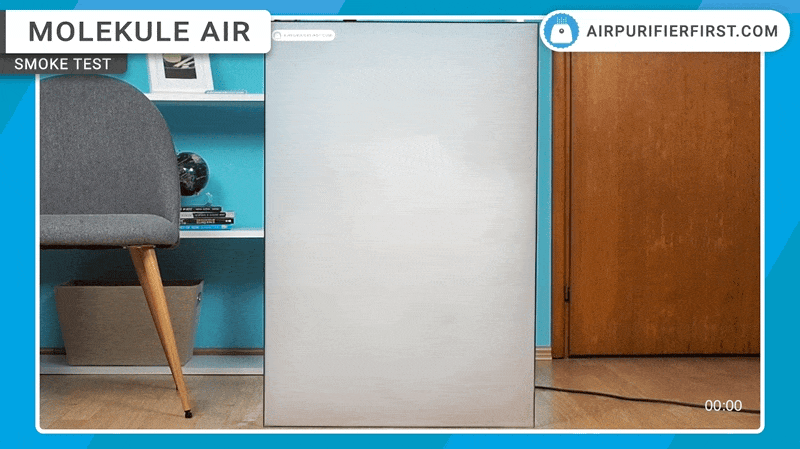
While this isn’t a perfect result when compared to some competing air purifiers, I must say that the Molekule did a great job here.
Smoke Box Test - Comparison
In this chart, you can see how quickly the Molekule Air removes smoke from a glass box compared to its competitors.
For example, the much bigger and more powerful Alen FLEX removed all the smoke in 32 seconds, which is about 3 seconds slower than the Molekule Air.
Noise Levels Test
Noise – Sound Level Tests:
9.3 - Average Score (67 products)
10 - Best Score (1 products)
8.2 - Worst Score (1 products)
We use a special noise measurement tool to test the noise level of the air purifier at all speeds. We measure the noise level on the dBA scale.
You can read more about our testing methodology here.
The Molekule Air has three fan speeds. It also has an auto mode, though it isn’t a true auto mode, as the Molekule Air doesn’t come with an air quality sensor, so there’s no way to automate its operation based on the current air quality.
In quiet mode, the noise produced by the Molekule is bearable, but the airflow and the device’s efficiency are also at their lowest.
Noise Levels Test - Comparison
This chart compares the noise levels at the minimum and maximum speeds of the Molekule Air air purifier with those of its competitors.
On the other hand, the boost mode is too loud, and I believe many users will find the high noise at maximum speed disturbing. In boost mode, the Molekule Air produces a sound level of 67.4 dBA, which is among the loudest air purifiers we have tested to date. The only air purifier nearly as loud as the Molekule at maximum speed is the Winix 5500-2, which produces 66.4 dBA.
I would like to point out that the noise levels in both silent mode and boost mode are constant, while the volume in auto mode depends on the room size setting you select when you start the device.
| Fan Speed | Molekule Air (dBA) |
|---|---|
| Boost Mode | 67.4 dBA |
| Silent Mode | 42 dBA |
Although it’s quite loud, I think the Molekule can still be used in a bedroom, but only in silent mode and with dark mode enabled if you’re bothered by the blue UV light.
The Molekule Air uses an 80W motor, which is typical for devices with a much higher CADR and larger room coverage, which isn’t the case with the Molekule. This is why I believe it could have been much better optimized.
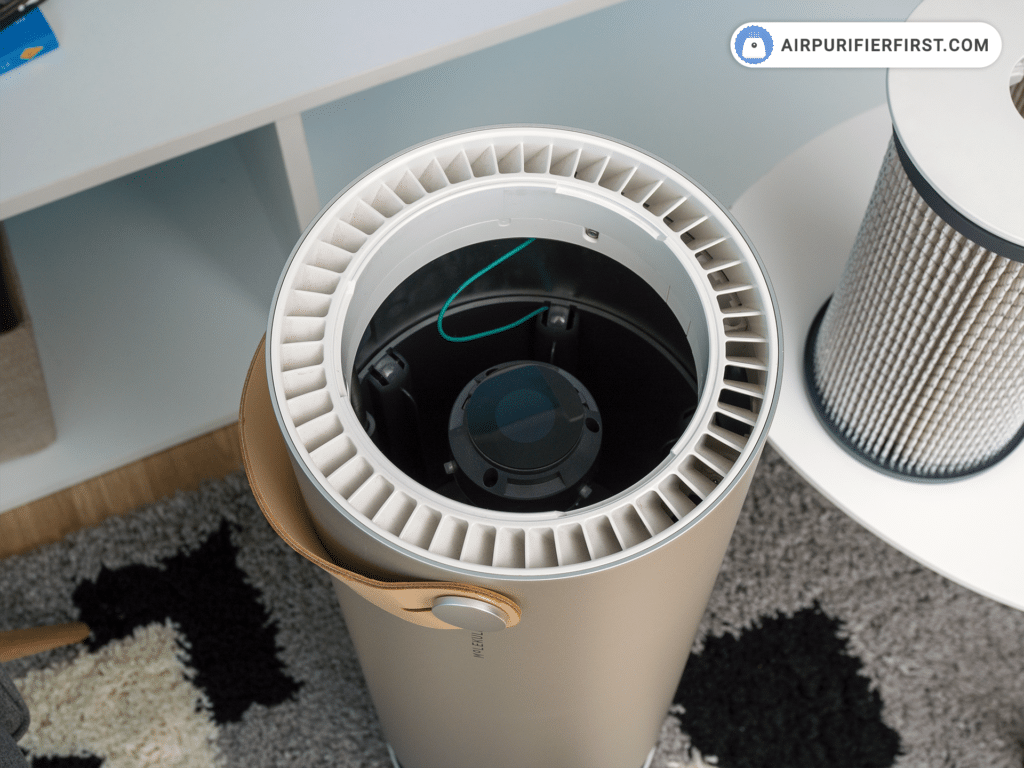
Interestingly, the ultraviolet light, which is an essential part of the PECO filtration, only consumes about 13.3W.
In standby mode, the Molekule consumes about 1.2W, while it consumes approximately 69.3W at maximum speed.
Monthly Power Cost – Comparison
Comparison of the monthly power cost at maximum speed between the Molekule Air and some of its competitors.
If you were to run the Molekule Air at full speed, 24 hours a day for a month, it would use about $6.08 worth of electricity. I’ve seen similar consumption with the Coway Mighty air purifier (about $6.05), which also has high power consumption at maximum speed.
However, when we compare it to much smaller air purifiers with similar or even higher CADR, it’s clear that the Molekule has room for improvement. For example, the Levoit Core 300S will cost you only $2.01 under identical conditions.
In addition to power consumption, the replacement filters are also quite expensive. The PECO filter needs to be replaced twice a year, and the pre-filter needs to be replaced about four times, making the annual maintenance cost very high.
| Fan Speed | Molekule Air (W + $/month) |
|---|---|
| Standby | 1.2W ($0.11) |
| Boost Mode | 69.3W ($6.08) |
| Silent Mode | 16.6W ($1.46) |
In general, the Molekule Air isn’t for everyone, and if you decide to buy one, you should be prepared for the fact that, in addition to the expensive device, the annual maintenance costs are also significant.
Filtration Technology
Filtration is the base of every air purifier. The air purifier’s primary performance starts with filtration. The larger the filters and motor, the more powerful the air purifier is. Molekule air purifier is a large air purifier that uses a patented PECO air filter. The filtration system is combined with two layers, pre-filter, and PECO filter.
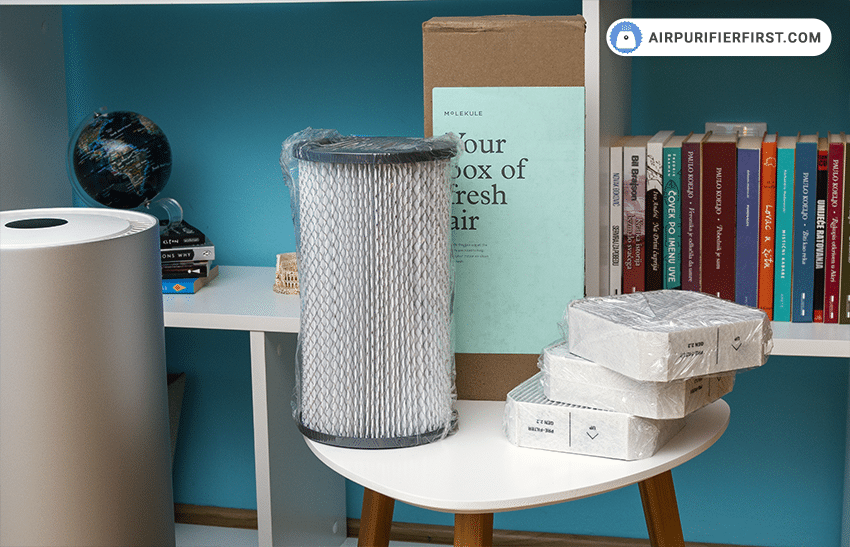
Levoit Vital 100 Replacement Filter
Always buy genuine filters for the best performance. As soon as the filter reset indicator is on, you are ready to change filters. Do it as quickly as possible.
Check Filters Price On AmazonBefore the first start, you may smell a weird smell, and that is normal. This weird smell is caused by off-gassing. Offgassing is releasing trapped gasses that were adsorbed in the machine during the non-working period. You should run a Molekule air purifier for up to 48h to break these gases.
Pre-Filter
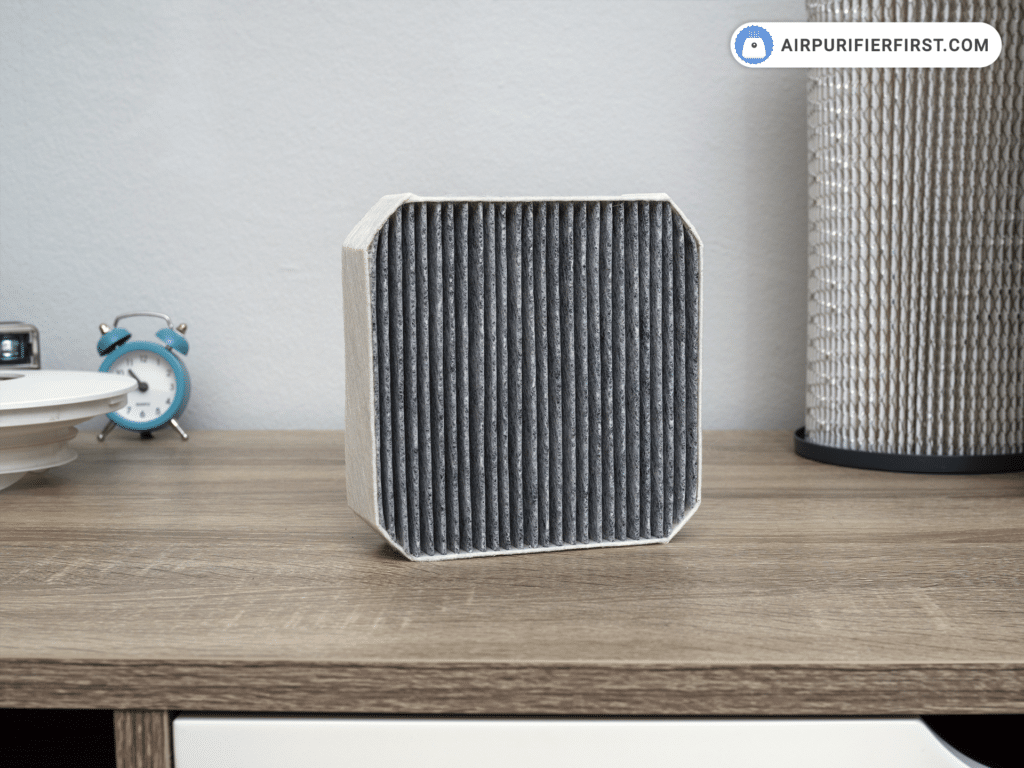
Pre-filter is nothing special; it is a simple MERV-12 pre-filter that we used to see in other brands. The main job of the pre-filter is to capture large particles, VOCs, dust, and other pollution before air hits the PECO filter.
PECO Filter
PECO stands for photoelectrochemical oxidation. This is not a new technology; it is a boosted version of PCO, aka photocatalytic oxidation. PCO has been used in industry for decades and is nothing new. Mainly it is used to clean contaminated water or air.
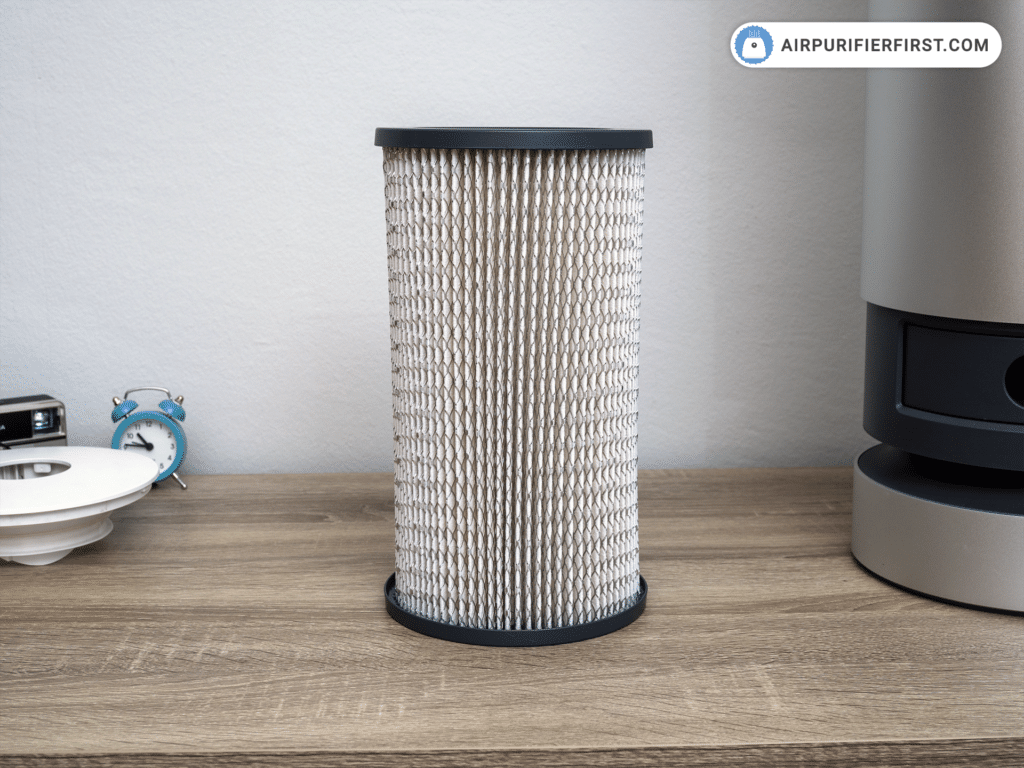
Regular HEPA filters trap airborne particles. However, PCO and PECO also remove gases. In other words, PECO removes nasty kitchen odor as well. PECO air purifiers use UV light, which breaks various pollutants on the molecular level in the process of filtration. PCO, an old technology, was not good at breaking these pollutants because sometimes, during the process it creates other harmful gases. PECO, however, claims that they fixed this issue and that this new PECO filtration system is much safer than PCO.
PCO was also not that efficient, and when we compare it with PECO, we can see drastic improvements. Molekule made a great innovation that now every home can use to filter air.
PECO vs. HEPA Filter
These two filters have very little in common. HEPA filters trap airborne particles while PECO breaks down airborne particles on a molecular level. True HEPA filters are very efficient and can remove 99.97% airborne particles from the air that are larger than 0.3 microns.
PECO, however, can destroy airborne particles that are even smaller than 0.3 microns which means that it can probably remove bacteria and viruses from your home.
I won’t go down into a big debate about which technology is better because each of it has its own perks and disadvantages.
How To Replace the Molekule Air Filters?
Molekule Air also needs filter replacements. Both filters need to be replaced. However, the pre-filter needs replacement every 3 months, while the PECO filter needs to be replaced every 6 months. The good news is that Molekule has an option that monitors filter replacement time, so you won’t need to manually count the time.
Total time: 10 minutes.
Step 1 – Accessing Filters
Firstly, unplug the air purifier. Then, access the filters by pressing down the top and rotating it counter-clockwise.
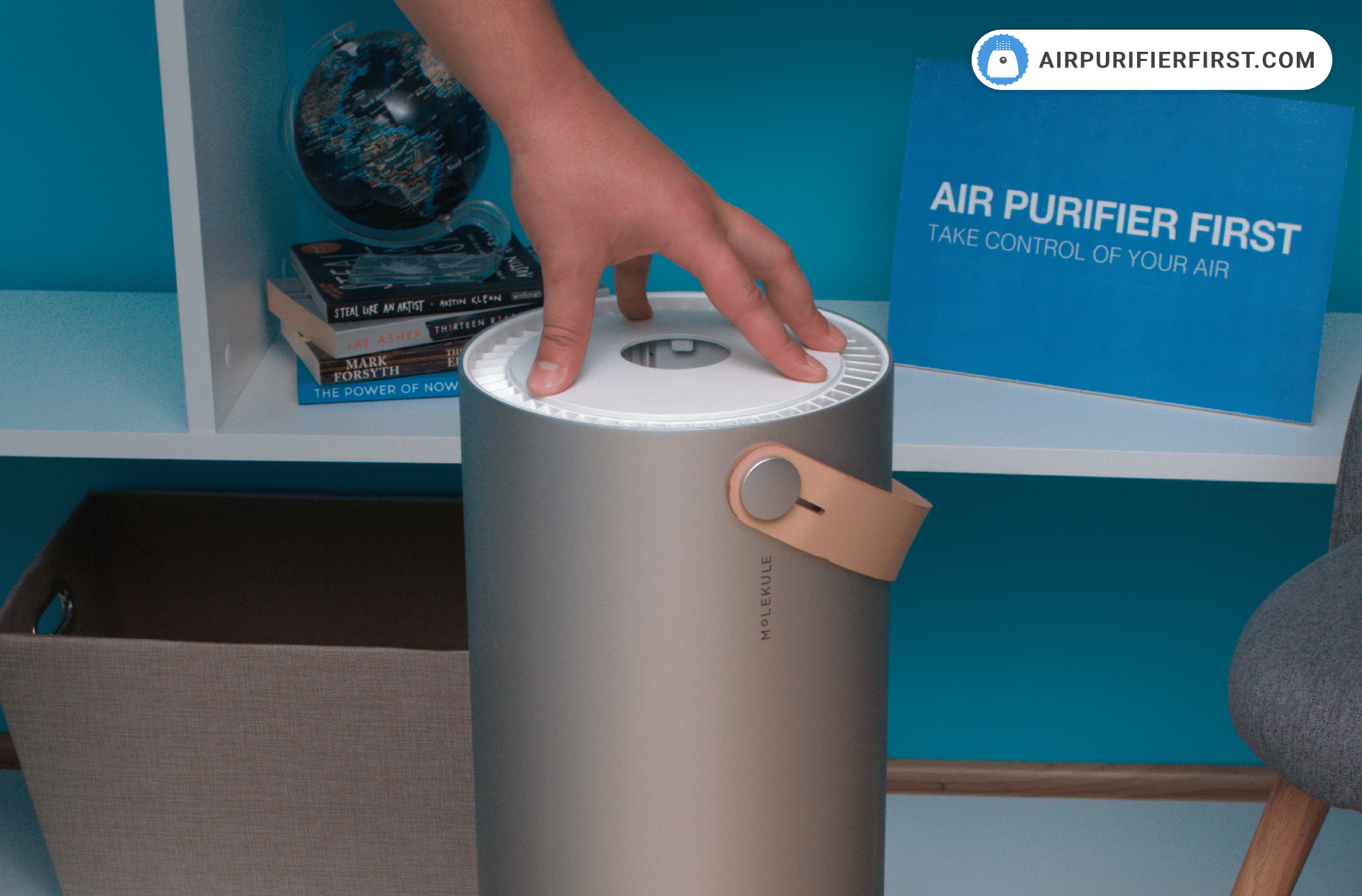
Step 2 – Remove Old Filter
Pull the old filter out.
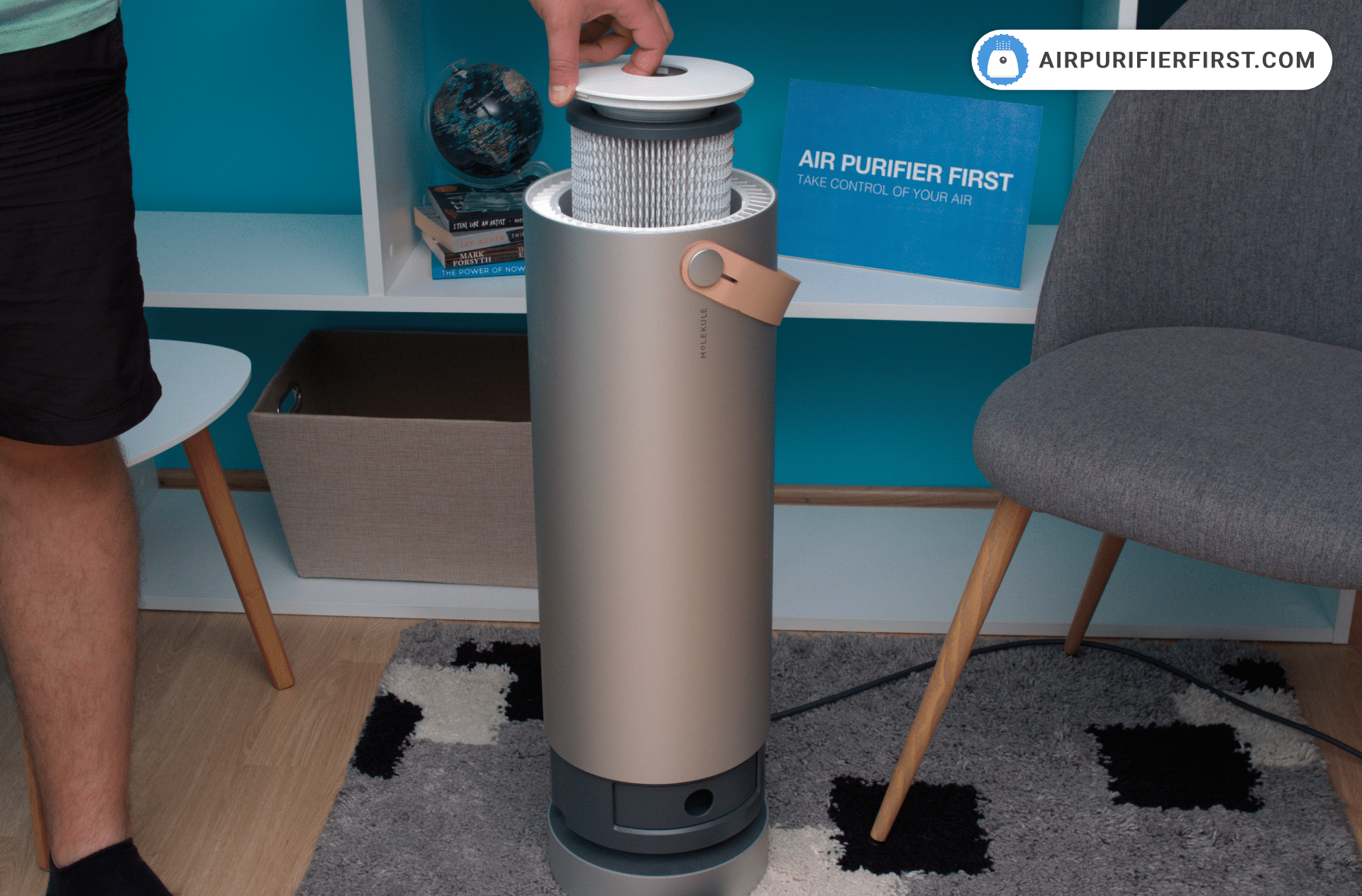
Step 3 – Separate Lid and Filter
Remove the old filter from the lid and dispose of it properly.
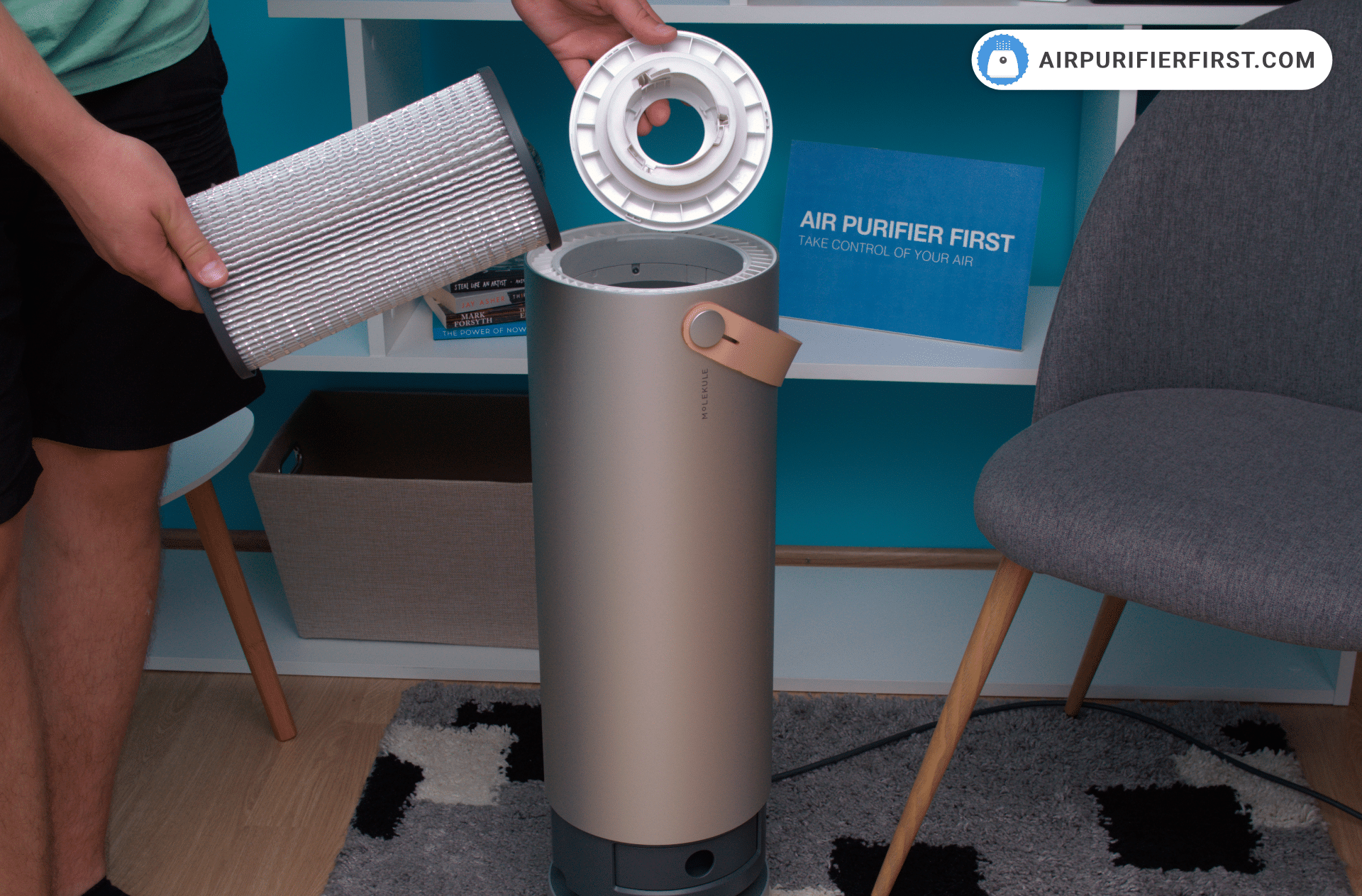
Step 4 – Preparing a New Filter
Prepare a new filter by unwraping it from a plastic wrap.
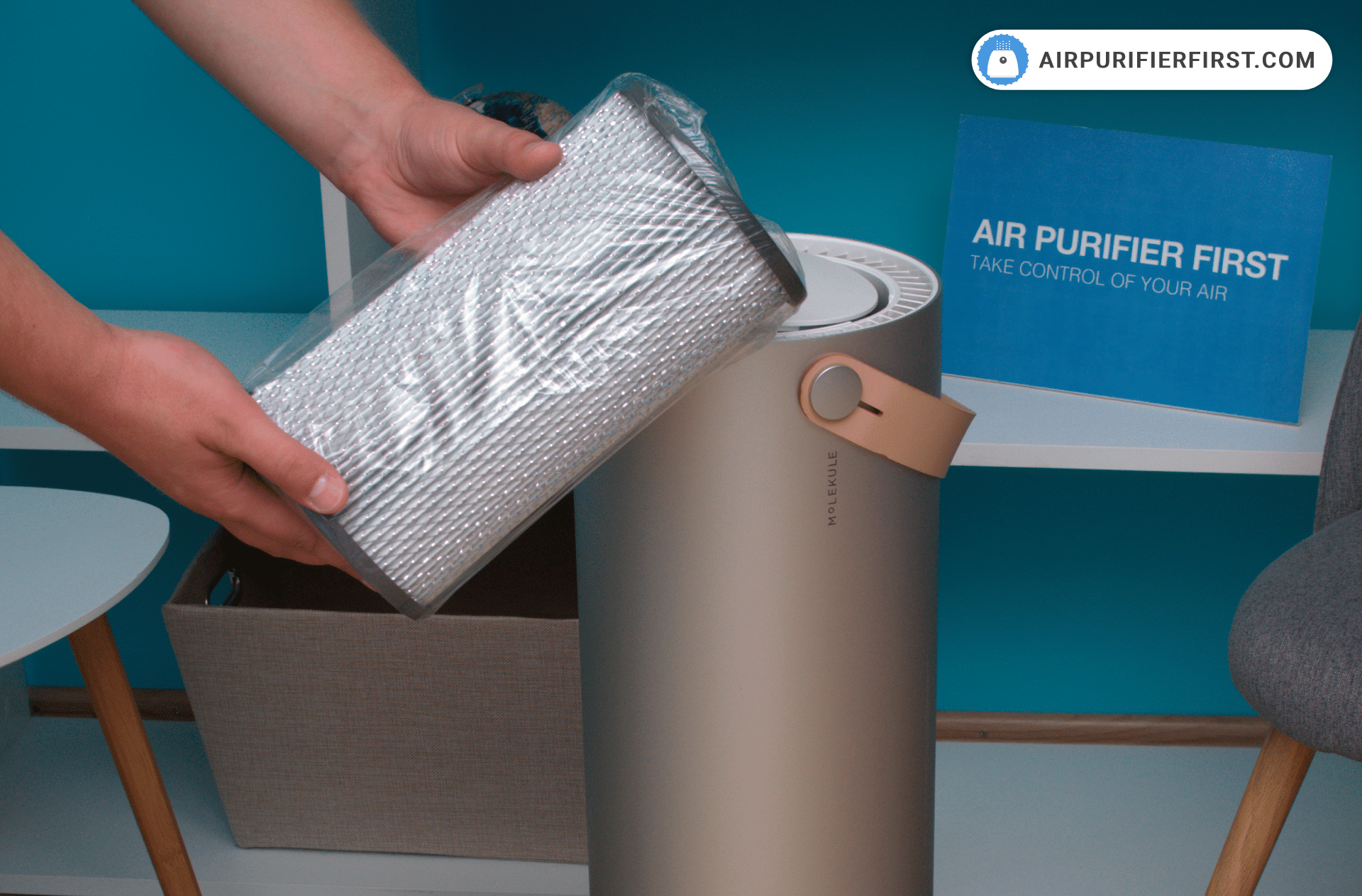
Step 5 – Put a Lid on the Filter
Take a lid and put it on the new filter.
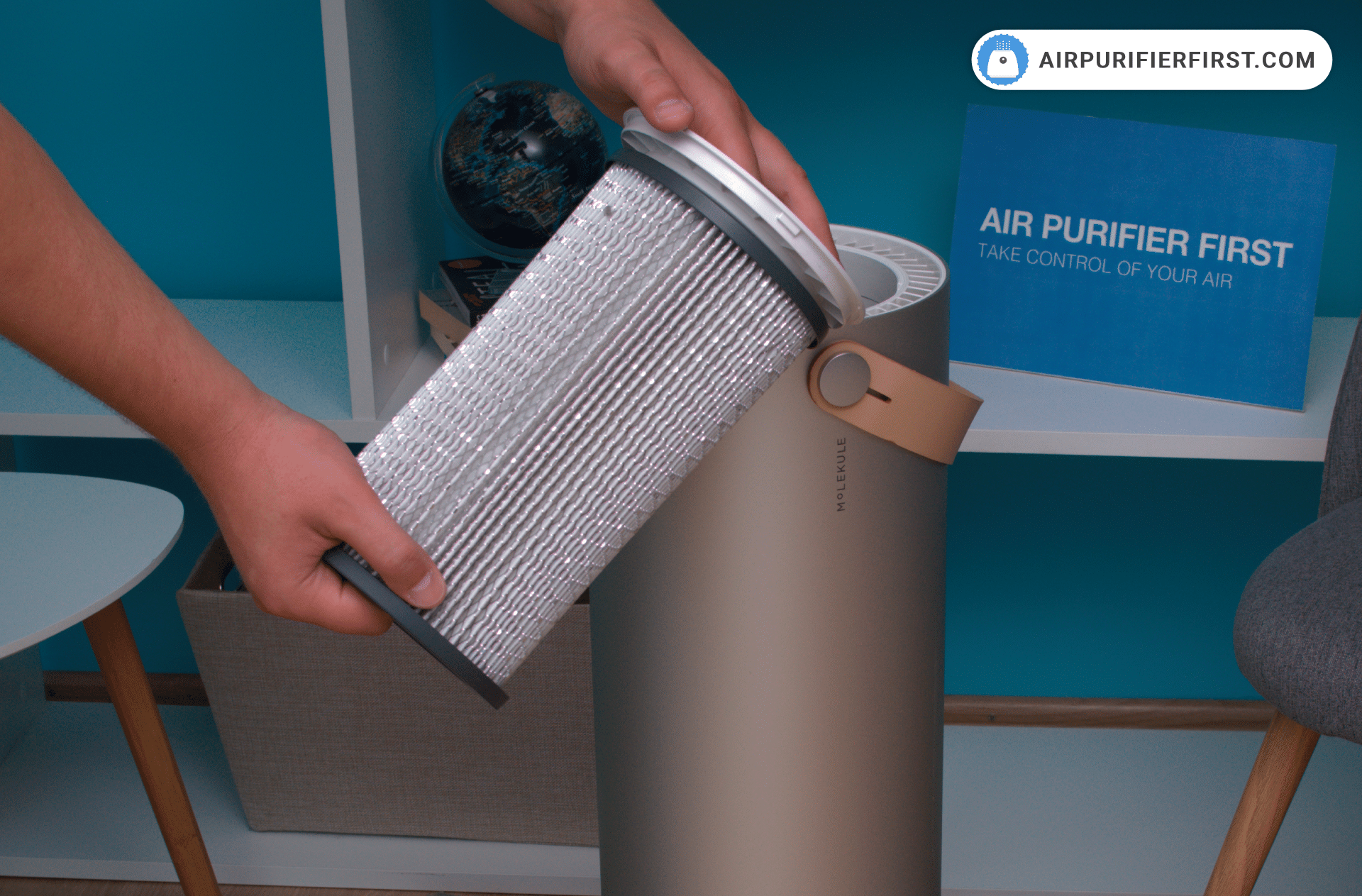
Step 6 – Put the Filter Inside
Put the new filter inside the air purifier.
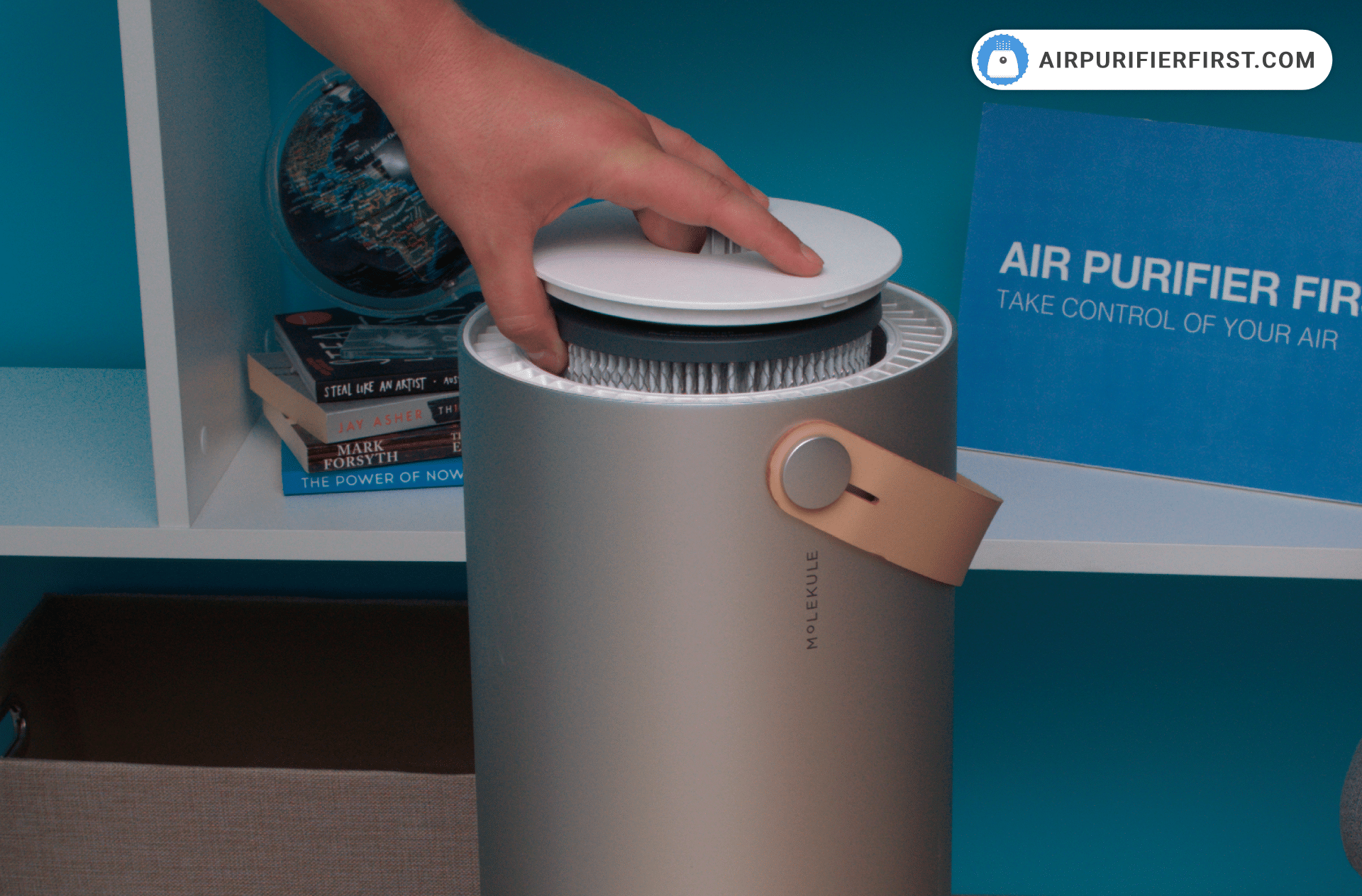
Step 7 – Resetting the Filter Indicator
Take a lid and put it on the new filter.
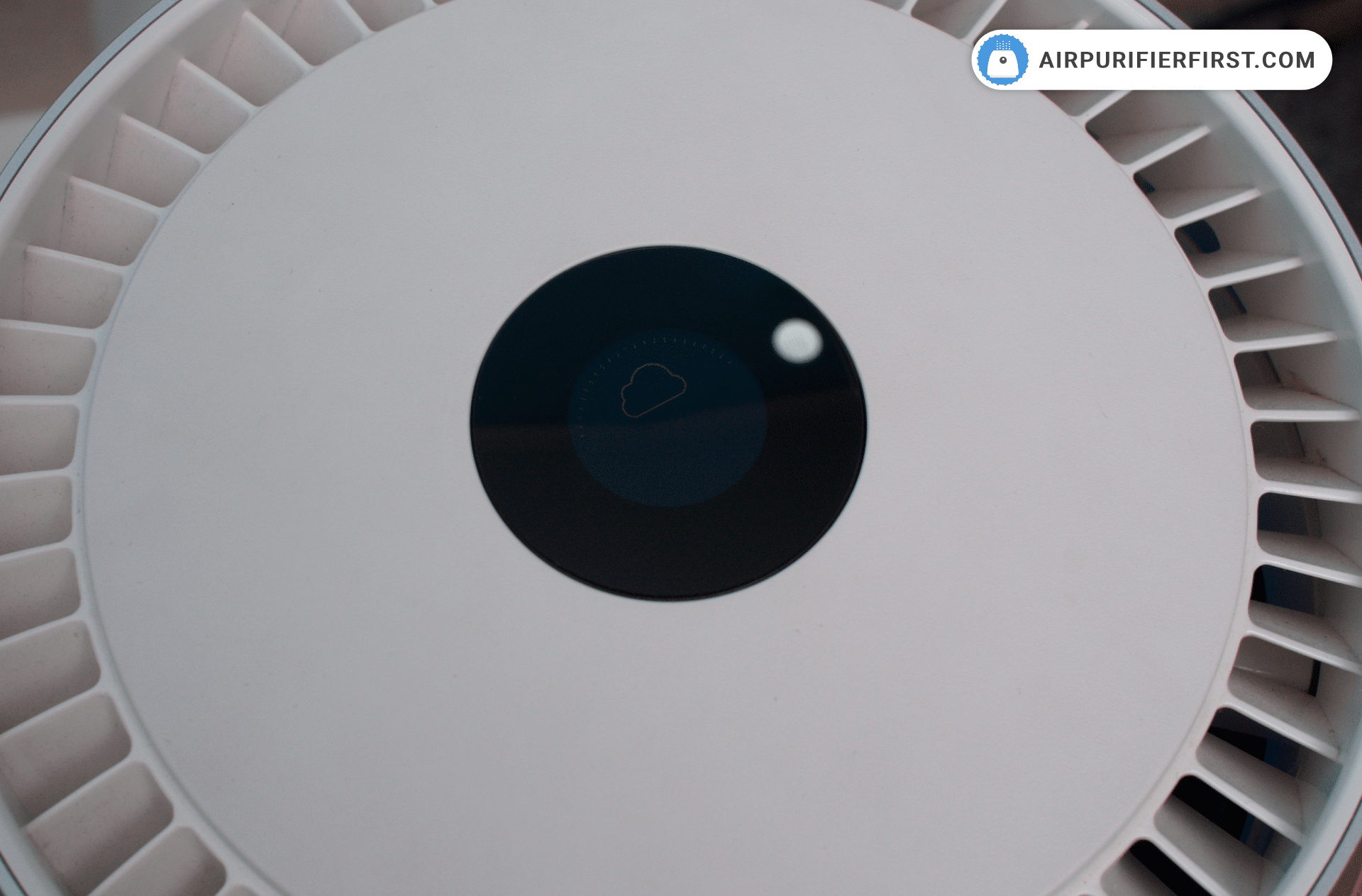
Installation and Setup
The Molekule Air Purifier requires some preparation before the first start.
I was surprised when I opened the box and saw how well this device was packed. Molekule fits perfectly into the box, which provides good safety when transporting. Just by looking at the box, you will see that this is one premium air purifier lurking inside. Inside the box other than the Molekule air purifier, you will find the user manual, protective bag, plugin cable, and extra pre-filter.
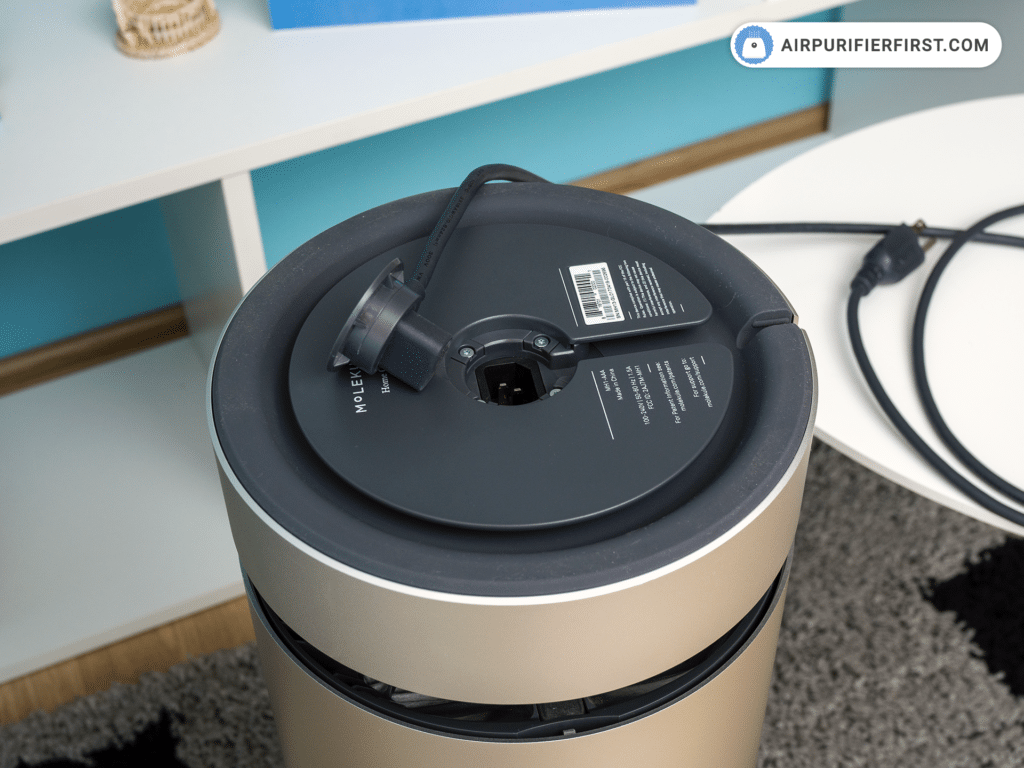
Before any other steps, most importantly, take the power cord out of the box and plug it into the bottom of the air purifier, as explained in the instructions. After that, plug the Molekule into the current, turn it on, and start purifying the air around you.
The first time you switch on the air purifier, it performs the “Initial Cleaning” cycle. During this cycle, the air purifier will adjust and set the settings according to your room’s exact size and location in the room. Before placing the unit in the desired location, please note that you should move it away from the wall at least 20 inches (approximately 50 cm) on all sides.
Design
The first thing I thought when I unpacked Molekule Air was, “Wow, that feels good.” Molekule had overshadowed me with the quality of the packaging and the aluminum casing, and the first impression this model left on me was incredible.
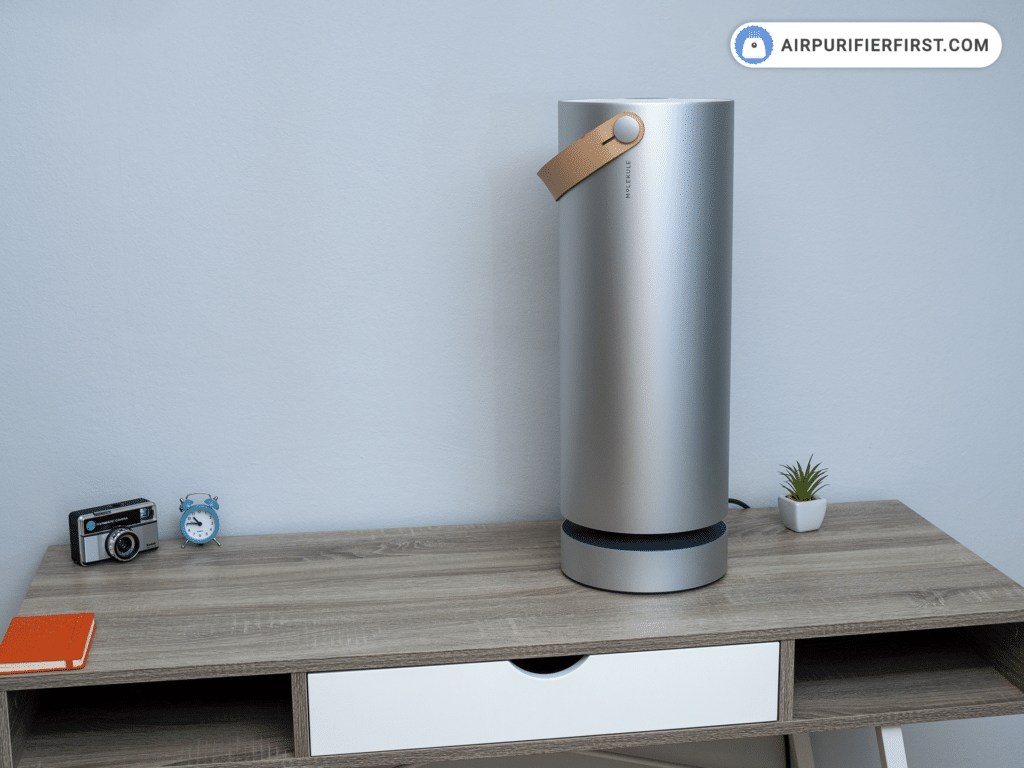
The silver aluminum casing occupies almost the entire surface of the device. On the top are the touch panel and the air outlets, which are plastic. The designers at Molekule have thought about every detail, so the carrying handle is a vegan leather handle, aesthetically integrated into the design. Although it makes carrying the device much easier, remember that this is a very heavy air purifier.
If I had to comment on the design in one sentence, I would say that the build quality is excellent; it radiates a premium feel. After testing the Molekule Air in my living room for a while, I have often had guests come up to me and ask what it is. No one believed that one air purifier could be so elegant and superb. Honestly, at first, it reminded me a little of a large speaker.
In short, the Molekule Air fits into almost any ambiance; whether you plan to use it in the bedroom, living room, kitchen, or any other room, I’m sure the Molekule will fit in just right.
Touch Panel
The touch panel is a unique feature when it comes to Molekule Air. It is located on the top side; it is round and has very good touch sensitivity.
However, I will come straight to the point and say that this touch panel is too small for my taste and that I very often get annoyed because, due to its small size, it does not respond appropriately when I run my finger across the screen. So it very often happens that, instead of swiping to another display device, I end up pressing a button.
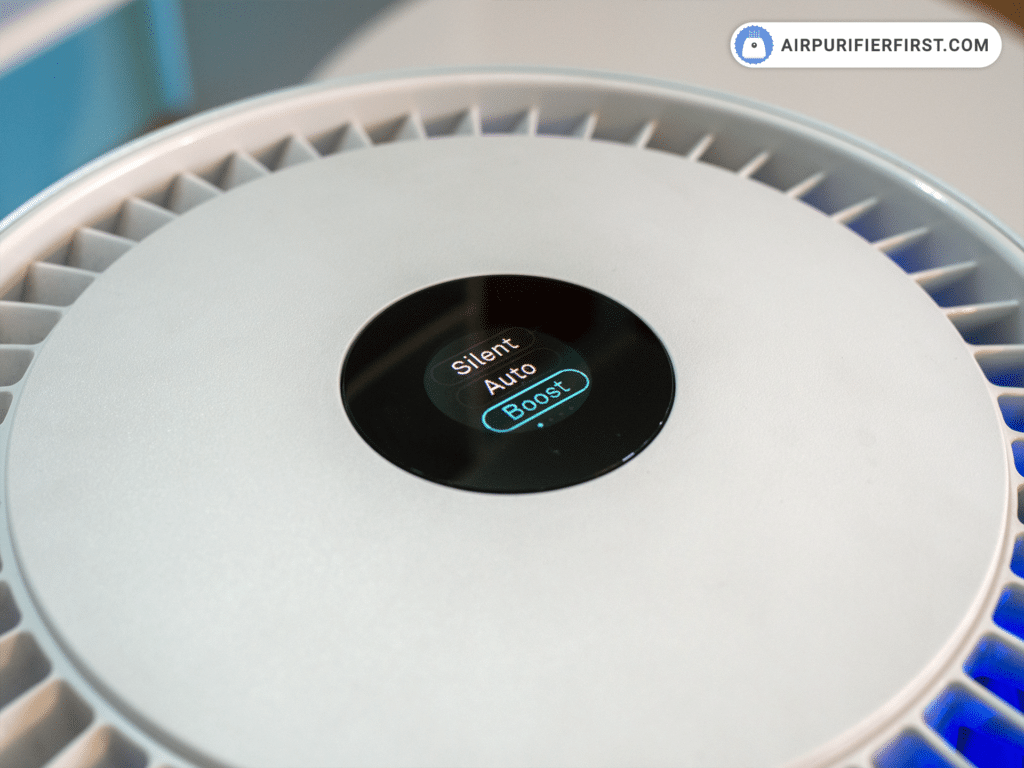
The touch panel contains all the needed options. The first screen shows a menu for selecting the mode: Silent, Auto, and Boost. The next screen shows the dark mode button, the next one shows the power button, and the last screen shows the current filter wear.
In addition, if you hold your finger on the touch panel for 10 seconds, a special menu opens with various settings, namely the option to disable the connection to the smartphone, the device information (serial number), the contact details for technical support, and the factory reset option.
Airflow
The Molekule Air is circular in shape with air inlets on the underside of the device. The Molekule draws in air from all sides, which then passes through filtration processes and exits through the openings on the top of the device.
As this device draws in air from all sides, you need to be very careful where you place it in order to use it to its full potential and not block the air intake from both sides.
Size and Dimensions
The air purifier weighs 18.0 lb. The dimensions of the device are: 8.25 x 8.25 x 23 inches. As much as I was surprised by the build quality and appearance of the Molekule air purifier, I have to say that I was also quite surprised by the weight.
The Molekule Air is one of the heaviest air purifiers I have had the opportunity to test so far, but thanks to the vegan leather handle carrying handle, I think the slightly increased weight will not be a problem.
I have the impression that the weight of the Molekule Air model makes it even more premium.
What’s in the box?
The Molekule air purifier purchase comes with Molekule Air, a power cord, pre-filter, PECO filter, and a user manual.
I recommend everyone go back to the beginning to the section where I explain how to set up the Molekule for the first time use, especially if you have problems installing the power cord, which is a bit specific.
Features Overview
Although a device in this price range is supposed to have several advanced features, this is not the case here. The Molekule Air has no advanced options to boast about; the device lacks an air quality sensor, an air quality indicator, an auto mode (a true auto mode), as well as a smart app that works without any problems.
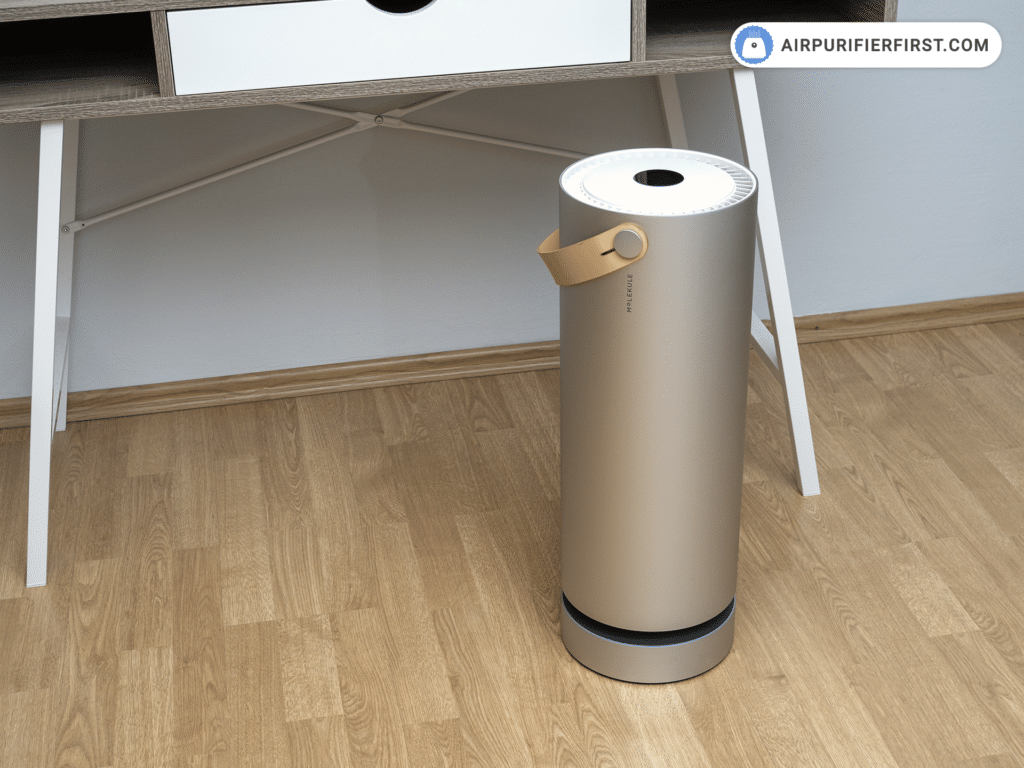
All this is a bit unexpected, not to say disappointing, but perhaps Molekule wanted the Air to be minimalist and elegant, which would be its main features.
Filter Status
Molekule monitors the filter replacement time to make it easier for users to change the filter. The current filter wear can be viewed in the app or directly on the touchscreen. The duration of the pre-filter and the PECO filter are shown separately as the duration of these two filters are different.
Somehow, I feel that the Molekule Air is the device with the least advanced options in the Molekule series. For example, since the Air Pro, Air Mini, and Mini+ do not require manual resetting of the filter life after replacement, they are all automated, and as soon as the PECO filter is replaced, the filter reset indicator automatically resets.
Molekule Air requires the filter reset indicators to be reset by pressing the “Reset Filter” button located in the smart device app. Suppose you cannot connect Molekule Air to the smart app. In that case, I’m afraid you will need to factory reset the device every time you change the filter to reset the filter reset indicators.
Automatic Mode (which it really isn’t!)
Molekule Air has an option, more specifically a mode, called “Auto Mode.”
Honestly, I don’t know what the purpose of calling it “Auto Mode” is if it is not the auto mode we are expecting it to be. Since the Molekule does not have an air quality sensor, it is almost impossible to have an auto mode that will change the fan speed according to the air quality.
I can conclude with certainty that the automatic mode in the Molekule air purifier is essentially medium speed, and that is not automation. I have, however, done a little more detailed testing. When you switch on the Molekule, it asks you, “Have you moved?“, if you select “Yes,” the device starts working according to the preset settings, and if you choose “No,” the device offers three additional options regarding the size of the room. According to the room size, the device will determine the speed, which will be your auto mode setting.
I tested whether the auto mode works with the same power with all three settings by measuring and comparing the power consumption.
The result is as follows:
- Suppose you select <200 m2 ft. The Molekule in auto mode will operate with a power of about 19.8W, and I have the feeling that the fan speed in this mode is close to silent mode.
- If you select 200 m2 ft. – 400 sq m ft. Molekule will operate in auto mode at approximately 21.2W, which is slightly more than the previous selection.
- And if you select >400 sq. ft., the Molekule will use about 23W in auto mode, aka the maximum. The volume and fan speed will be closer to Boost mode than Quiet mode.
I would note that there are still some differences in auto mode use at different room size settings, but no matter how we look at it, we can’t label it as auto mode at all, perhaps as semi-auto mode.
Dark Mode
As far as I understand, when the dark mode is switched on, the Molekule PECO technology has no function, and the air is only filtered through a pre-filter, which is, of course, not sufficient for quality filtration.
I have tested this feature and turned on the dark mode in a 320 sq. ft. room, leaving the unit to run in boost mode. In 30 minutes of operation, the Molekule reduced the AQI from 54 to 22, improving the air quality by about 59%, a very poor result.
Because of these results, I would not recommend the frequent use of the dark mode, as the performance of the Molekule air purifier is obviously much weaker in that mode.
Interestingly, this conclusion can be found in the manual, which says, “we recommend using the dark mode only when necessary.“
Warranty
Molekule Air has a limited 2-year warranty. As many competing devices have shorter warranties, I can say that this is an average warranty and that I expected more, especially for a high-end device. Some other top-end air purifiers, such as the Alen BreatheSmart FLEX, have a choice of a 1-year to a lifetime warranty.
Molekule Air Smart App
The Molekule is presented as a smart air purifier that can connect to a smart app. However, this has proven not to be the case in practice, especially when looking at the very poorly rated apps in both the Android and iOS stores. To be honest, I have yet to see a worse app in the store than this. Unfortunately, the situation for me is similar to many other users; also, due to several attempts with several different devices (Android and iOS), I could not connect Molekule Air to the smart app.
If I keep researching and reading, it seems that I have not missed much because I have not been able to connect to the smart app. After all, the app is almost useless. The Molekule smart app only offers remote device control as far as I have seen advanced options.
Although I could have connected to the smart app, I would have had almost no benefit, but I have to say that I regret very much not having done so, precisely because it is to be expected that an air purifier in this price range does not have this kind of problem.
For a successful connection to an internet modem, you must set the router to 2,4 GHz.
Room Coverage and CADR
Molekule Air is designed for rooms up to 600 sq. ft. However, after all the tests I have done, I would say that the best performance is in much smaller rooms, so my recommendation would be to use this model in rooms up to 300 sq. ft. and even much smaller.
Given that the Molekule Air has a CADR of around 100 CFM, I would say that I would argue that this model is best used in much smaller rooms of 600 sq. ft. It fits ideally in a smaller bedroom, living room, kitchen, or any other room, as it is first and foremost a very beautiful device. However, remember that you need to pay attention to the room’s dimensions before you decide to install it.
FAQ on Molekule Air
Does Molekule produce ozone?
Nope. As confirmed by the statement on the Molekule website, “Our air purifiers not only do not emit ozone, they destroy it.”
What is the Molekule Air warranty?
Molekule offers a 2-year warranty on the Air model.
Does the Molekule Air Purifier actually work?
The Molekule Air Purifier definitely does the job it is designed to do. However, the performance of this model is not even close to my expectations.
Leave a Reply